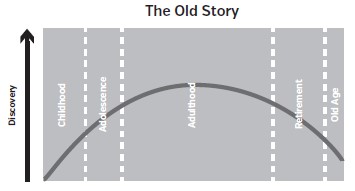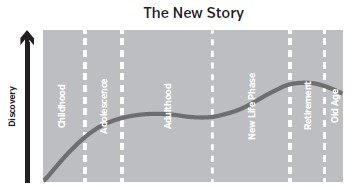Are you at a point in your life where you’re asking “What’s next?” You’ve finished one chapter and you have yet to write the next one. Many of us face these transitions at midlife, but they can happen at any point.
For the last forty years, I have had the privilege of traveling worldwide giving keynotes and workshops, and have flown well over two million miles to these scattered venues. As a result, I have witnessed what touches people, what enlivens them, and what gets them up in the morning. And I have heard this refrain over and over:
“This isn’t what I was expecting!”
I listen for a living. As an executive/life coach, my conversations about “What’s next?” often end with a varied list of things that people didn’t expect:
- I didn’t expect to be divorced at my age – or to be beginning a new relationship.
- I didn’t expect to be unemployed – or to have the opportunity to start my own business.
- I didn’t expect to be retired – and feeling isolated and bored.
What they didn’t expect, for sure, was that they would have to keep figuring it out, no matter what their age.
Rather than preparing for a traditional retirement, many adults, today, are facing periods of transition and change unprecedented in previous generations. From exciting new opportunities to challenges that seem to come out of nowhere, a new life phase – a stretching of the productive, creative, and purpose-driven peak of life – has challenged conventional choices about the second half of life.
Old Age is Constantly Getting Older
With 10,000 people turning 65 each day in the U.S., and longer lives ahead, it’s time to unpack outdated assumptions about aging and reimagine the new realities. Many of our assumptions date back to a time when people grew “old” in their 40s and 50s. U.S. life expectancy in 1900 was age 47. At the introduction of Social Security in 1935, it was age 60. Today, many people remain vital and capable well into their 80s, with those 90 and beyond representing one of the fastest growing age groups.
In retirement, former U.S. President, Jimmy Carter, asked the question, “What is good health?” His own answer offers insight into the new phase of life: “more than being able-bodied, it involves self-regard, control over our own affairs, strong ties with other people, and a purpose in life.”
Science confirms that Jimmy Carter got it right. Good health is more than just the absence of illness. It is a choice to not just add years to our life, but to add life to our years. Yet, everyone ages and retires different ways. There can be no one-size-fits-all. We are each an experiment of one.
Adding Life to Years
The phrase “adding life to years”, not just more years to life is critical given increasing life expectancy.
Positive aging can begin at any age, and can be created in many different ways. Becoming aware of the paradoxes of aging, can have a powerful effect on how we experience aging.
The levels of happiness and fulfillment can be quite high in older age, often higher than in midlife. This represents what is called the “paradox of well-being.” Older adults often report high subjective well-being despite facing possible changes in health and declines associated with aging.
A large-scale study showed that among those over age 75, move than 80% reported being happy or very happy. (Pew Research Center – Growing Old in America: Expectations vs Reality). Most rated their own experience of aging more positively than what their younger selves would have expected of themselves in old age.
The new phase of life is filled with paradoxes – loss and gain, finishing and starting, retreating and risk-taking, fear and optimism, liberation and attachment, caring for self and caring for others, saving the world and savoring the world.
Subjective Age
The best gauge for your age, and your longevity and overall well-being, is how old you feel – your subjective age. Research has shown that subjective age is, in fact, a better predictor of our overall well-being and longevity.
“How old are you?”
Most people would reply by referencing the date on their birth certificate. This is your chronological age.
“How old do you feel?”
In my interviews with people over age 65, I find that people often report feeling anywhere from 10 to 20 years younger than their chronological age. For example, a 65-year-old might feel 45 and a 75-year-old reports feeling 60. And, most interviewees think old age starts around 85. Paradoxically, we can feel younger as we age.
“What are your expectations about aging?”
The traditional view of life viewed is like a semi-circle with its peak at age 45 or 50, followed by a slow decline to retirement and death on the other side of the milestone age 50 midlife birthday. In my coaching people about retirement, I try to quickly get clear about their assumptions about that phase of life – their “subjective” age.

I ask people, “How much do you agree or disagree with each of the following statements?”
- The human body is like a car; when it gets old, it gets worn out.
- I expect that as I get older, I will spend less time with friends and family.
- Being lonely is just something that happens when people get old.
- As people get older, they worry more.
- It’s normal to be depressed when you get old.
This partial survey from the “Expectation Regarding Aging (The Gerontologist, Volume 45, “Development of the 12-Item Expectations Regarding Aging Survey, 45 [pages 240-248]) survey measures our attitude toward aging. If they agreed with most of the statements listed, I sense that they have a pretty traditional outlook on aging and retirement as viewed in The Old Story. And, their expectations will definitely influence how they age, how long they might live, and what they will do in retirement.
A New Life Phase
Incorporating a new life phase of purpose and positivity can radically change “the old story.” Rather than beginning a precipitous decline, our creative, purposeful years can become extended allowing us to choose to live our lives much differently.

The new life phase is past middle age, but is not equivalent to retirement or old age. Psychologists worldwide have found that well-being follows a “U-Curve,” with self-reported happiness at its lowest in the 30s and 40s, and then increasing steadily beginning at age 50. This is in keeping, too, with longitudinal and brain research finding that our lives continue to evolve positively in our later years.
Embracing a new life phase often involves mistakes, paradoxes, and challenges. Recognizing that you’re entering this new phase of life creeps up on you. You often don’t feel old, but then one day you notice that “I’m the oldest one in the room!” Not every day, but surprisingly often.
Viewing a new phase of life can provide a remarkable new mindset. While the “old story” was one guided by a goal of freedom “from” – freedom from responsibilities, the “new story” is one guided by freedom “to” – freedom to create and choose the life one wants to live.
A new phase of life feels a little bit like a second adolescence. The structures we fit into comfortably a decade ago – socially, professionally, relationally – start to feel like a poor fit. We need a new purpose, a new vision, encouragement, and a personal plan to make this newly available phase of life our best life.
Aging with Purpose
When I tell people about my interviews with older people and my studies of “aging with purpose”, they often come up with examples of people I should interview. They suggest parents, grandparents, teachers, religious figures, and family friends.
Who would you recommend that I interview?
“Who is your new life phase role model?”
Try to name three people whom you admire for how they are aging with purpose. What qualities would you like to embody in your own way?
A new phase of life involves having a purpose in life, whether it is a job, being a mentor, having connection to others, or a spiritual conviction. The older adults I have interviewed have made a significant impact on other people’s lives, sometimes including my own. Having a sense of purpose can add years to our lives and bring happiness to those around us. As Maya Angelou claimed, “I’ve learned that people will forget what you said, people will forget what you did, but people will never forget how you made them feel.”
What’s Next?
The need for a new narrative on aging and retirement is bolstered by the latest research in medical, neurological, psychosocial, and financial development throughout the life course. Research has shown that resilience – the ability to adapt to stress, transitions, and adversity – increases throughout midlife and beyond. By middle age, we’ve had our share of life experiences and have gained some wisdom about “What’s Next”?
A new life phase can take on a whole new dimension when you discuss it with partners, friends, family, and colleagues. In a variety of ways, we feed off one another’s ideas, stories, and insights. The result benefits everyone.
Here are three questions to help you start “What’s Next?” conversations at home, at work, in your book group, at your place of worship, or in your social circle:
- Do you agree that there is a new phase of life between middle age and old age, with unique characteristics and possibilities? If yes, what are some examples of role models of this phase that you know of?
- Before reading this piece, did you think about a longer life as a problem or a possibility – or both? Did the piece change your mind?
- Do you feel the desire to get up in the morning committed to making a difference? Do you feel it more strongly at this phase of your life?
Richard Leider, founder of Inventure – The Purpose Company, is one of America’s preeminent executive-life coaches. He is ranked by Forbes as one of the “Top 5” most respected executive coaches, and by the Conference Board as a “legend in coaching.” Richard has written ten books, including three best sellers, which have sold over one million copies and have been translated into 20 languages. Repacking Your Bags and The Power of Purpose are considered classics in the personal development field. Richard’s PBS Special – The Power of Purpose – was viewed by millions of people across the U.S. Click here to view and/or purchase Richard’s books.


